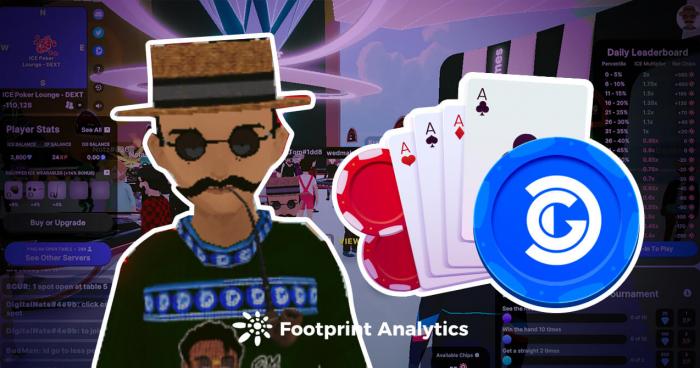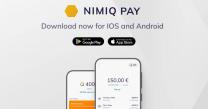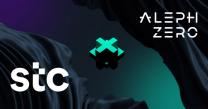 What is ICE Poker, the game underpinning Decentral Games?
What is ICE Poker, the game underpinning Decentral Games? What is ICE Poker, the game underpinning Decentral Games?
Decentral Games' poker room has brought a new utility to the metaverse.

Cover art/illustration via CryptoSlate. Image includes combined content which may include AI-generated content.
Interest in the metaverse continues to rise, with Footprint Analytics data indicating that metaverse projects received the third most investments in the blockchain industry after games and tools.
Decentral Games is one of these projects, having grown significantly since last December while receiving several rounds of funding, including a strategic investment from Decentraland. It has also received strategic investments from industry leaders such as BSC, Digital Currency Group, Polygon, Arca Funds, and Hashkey.
What is ICE Poker?
Decentral Games’ ICE Poker was launched in Oct. 2021. The game allows players to earn tokens by playing for ranking on the leaderboard.
The team believes that open metaverse will be the next evolution of the internet, and Decentral Games aims to allow anyone to earn from playing familiar games like poker.

How to play
Players need to purchase or be delegated at least one wearable NFT to begin their journey.
Players receive chips every day based on the number of NFTs they have, and will earn ICE tokens and XP for completing different levels of daily challenges. Players can earn up to a 1.4x rewards multiplier by adding wearable NFTs.
The Daily Leaderboard will also affect the multiplier for rewards, which will be based on the player’s rank in the leaderboard and multiplied by the performance multiplier.
The top 40% of users will get a performance multiplier ranging from 1 to 2, and the bottom 60% will be multiplied less than 1. This means that the bottom users will lose a portion of the ICE, and the bottom 96% of users will only receive 0.05 x the ICE for the day, losing 95% of their revenue.
To earn more ICE, players can also burn ICE and XP to upgrade NFTs to increase rewards by up to 35 – 45% of ICE bonus.
Player roles
In ICE, players have different roles:
- Player-owner
Players can purchase wearable NFTs through minting or at OpenSea. Currently the floor price of NFTs on OpenSea is 1.215 ETH, which equates to at least $3,700 before playing the game.
Players can use their NFTs directly to earn ICE rewards, and earn ICE bonuses by upgrading their NFTs and ranking in the game.
- Delegated player
The initial cost of NFTs is too high for many on Decentraland. Luckily, players can rent wearable NFTs by receiving a delegation from ICE Wearable owners.
However, players will only receive 60% ICE rewards and the remaining 40% will be split to the NFT owner. As the NFT rank increases, the draw for the NFT owner will gradually increase.
- Guild owner
There are delegated players and those who enable others to play. The NFT owner can delegate one or more of his wearables and create an ICE Poker Guild.
Depending on the size of the guild and the amount of xDG, players can also organize participation in the ICE Poker League for the chance to earn more xDG rewards.
While NFT owners can earn passive income from delegating, they are also exposed to volatility in NFT prices. Players need to evaluate the payback period, and if they delegate to a delegated player with poor results, they will receive much less ICE.
Tokenomics and data expressions
In Decentral Games, there are two tokens that can be traded.
- DG
DG is primarily used to access and upgrade wearable NFTs, and staking DG will earn the governance token xDG.
The xDG grants access to advanced ICE Poker Guild tools, voting rights to modify economic incentives and manage treasury funds, as well as a share of fees in the ecosystem.
DG will issue 1 billion over 6 years, 62% of which will be distributed to the community, 20% to teams, and 18% to early adopters.
- ICE
ICE serves as an in-game token that incentivizes players to participate in the game and upgrade their NFT.
The entire supply is allocated to community rewards and liquidity. To alleviate deflationary pressure ICE will be burned by upgrading the NFT and excess profits from the DG treasury.
According to Footprint Analytics, both DG and ICE are currently trading at no more than $1.

In terms of users, the number of users has grown rapidly since December, with 8,260 users as of March 23. This is mainly from December, and the growth of new users slowed down after January.
On December 31, 2021, a New Year’s Eve Party & Celebration was sponsored by OKEX and hosted performances by artists such as Cristy Lawrence, Rich DietZ, Fluencee and Medii. Decentral Games also had a scavenger hunt, all of which brought it a lot of attention in December.

Decentral Games’ new user ratio has gradually dropped to below 5% since February, and most of the daily active users are old users, but it also reflects that old users are still sticky.

Reflections on Decentraland
Decentraland has gained a lot of traffic due to Decentral Games’ poker room, giving Decentraland’s metaverse a utility. But there is still much for us to think about.
First, most GameFi games have a prohibitively high barrier to entry. The play-to-earn model has become pay-to-play-to-earn.
The cheapest NFT in Decentral Games costs $3,700, compared to the price of $0.09 for ICE. Players need to mint at least 40,000 to make back the money. And in Decentral Games, it is not always possible to earn ICE by “hard work”, there is a lot of luck involved.
Secondly, although Decentral Games has removed the word casino from its home page, it is still essentially gambling. Projects built on gambling will face policy risks. In particular, some countries explicitly ban the gambling industry, and in the world of blockchain without KYC, this undoubtedly creates a gray area.
Date & Author: March 09 2022, Simon
Data Source: Footprint Analytics Decentral Games Dashboard
This piece is contributed by Footprint Analytics community.
The Footprint Community is a place where data and crypto enthusiasts worldwide help each other understand and gain insights about Web3, the metaverse, DeFi, GameFi, or any other area of the fledgling world of blockchain. Here you’ll find active, diverse voices supporting each other and driving the community forward.
What is Footprint Analytics?
Footprint Analytics is an all-in-one analysis platform to visualize blockchain data and discover insights. It cleans and integrates on-chain data so users of any experience level can quickly start researching tokens, projects, and protocols. With over a thousand dashboard templates plus a drag-and-drop interface, anyone can build their own customized charts in minutes. Uncover blockchain data and invest smarter with Footprint.


















































